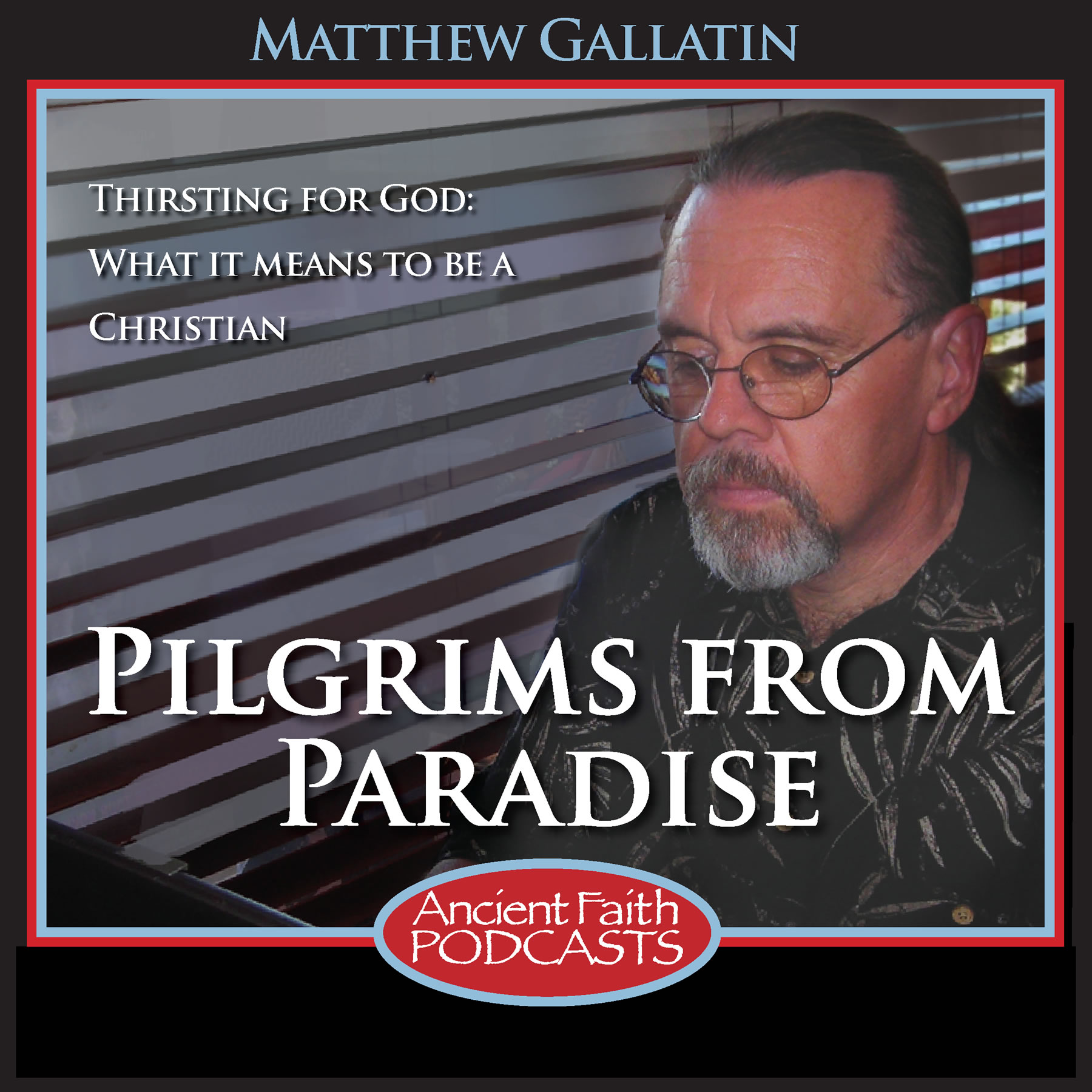Pilgrims from Paradise
No Salvation Outside the Church
So what does it mean "There is no salvation outside of the Church?" Matthew explores that in this week's episode.
Thursday, December 30, 2021
Listen now DownloadSupport podcasts like this and more!
Donate NowTranscript
Jan. 22, 2016, 3:02 a.m.
Last week, I responded to a listener’s question as to how oneness in doctrine and practice relates to oneness in Christ. This week, I want to take up his second question: What does the patristic slogan, “No salvation outside the Church,” mean? From the perspective of the original faith, does one have to be a member of the Orthodox Church to be saved?
Well, first let’s consider what the Church is. The Church is that single, undivided body of Christ that has endured across time and cultures from the day of Pentecost. Most definitely, it is not the mystical je ne sais quoi suggested by popular slogans like the one I saw on a bumper sticker the other day: “The true Church is invisible.” No, the Church is a very concrete, identifiable unified collection of believers. They are joined together by (1) apostolic succession and (2) their shared experience of Christ, which is evidenced by their mutual commitment to one doctrine, one worship, and one spiritual lifestyle.
Real oneness is objective, observable, and definable. It is mutual participation in the person of Christ. People who hold contradictory doctrines about Jesus and yet insist that they worship one and the same Christ obviously cannot have their faith grounded in the single person of Jesus Christ. For as a person, Jesus is who he is and is not who he’s not. He is humble, not proud. He is infinitely gentle with repentant sinners and quite hard on the self-righteous. As a person, he has only one way of saving people, only one program when it comes to how end-time events play out, etc.
What’s more, Jesus is a very special person in the sense that he, like the Father and the Spirit, admits absolutely no variation whatsoever (James 1:17). He cannot change over time, nor can he be a different Christ to different people. So when Christians with conflicting doctrines claim unity in Christ and thus joint membership in the Church, they cannot possibly be appealing to the strictly defined, unchangeable, and unvarying person, Jesus Christ. To imagine themselves one, they instead must invoke a Jesus who is a mental construct, some non-specific universal idea of Jesus, which is capable of being interpreted and shaped into a multitude of different specific christs.
But this is not Christian thinking or scriptural thinking at all. It is, rather, a powerful example of the Platonic mindset that has influenced Western Christianity since the days of Augustine. But no such ideal Jesus exists. There exists only the very real, strictly defined and specific person, Jesus Christ.
Let me put it this way: Jesus is not some universal idea that we must acknowledge in some form or another. He is a particular person whom we are we required to love. Ideas of Jesus can be encountered everywhere, but the one true person, Jesus Christ, can only be encountered in his body, which is his Church, the pillar and ground of the truth, as St. Paul describes it in 1 Timothy 3:15. To be part of this unified body is to be in the Church.
Certainly, the Orthodox [understand that] to be “in the Church” means to be Orthodox. Thus, we can say with perfect confidence that salvation resides in the Orthodox Church. But what about those who profess Christ who are not Orthodox? Are they not saved? As an Orthodox Christian, I’m glad that I’m not required to divvy up people into categories and confidently declare them “saved” or “unsaved.” As a friend of mine, back in my Jesus people days, used to put it, “God doesn’t give me the burden of making that judgment about any individual, whether they are outside or inside the Church. That’s up to Jesus.”
Still, as an Orthodox Christian, I know that God has been working in all times and places from the beginning of time to fulfill Christ’s prayer in John 17:21-23: “To bring every soul to a mutual oneness in Christ.” Given God’s power, his infinite mercy, and his relentless eternal love, I would never say that God can’t find a way to save someone who is outside the Church. But the question is: Should people who stand outside the Church be willing to bet their eternal destinies on that possibility? We know that the Spirit carries out his transforming work of salvation in the Church. Why not just embrace it? To me, there’s just too much at stake to trust my salvation to anything but active participation in the life of Jesus Christ himself, and the only place to be certain that I’m encountering him and not just my own idea of him is in that Church into which he has historically and verifiably poured himself since the day of Pentecost.
Even if there is salvation outside the Church, to be outside the Church is to be exposed to confusion about God. One can easily be led astray. Even if one doesn’t out-and-out reject Jesus Christ, one can fall in love with a christ who is just an erring idea. We must remember that the relationship we forge with Christ here and now is the one we will carry into the eternal kingdom.
In light of that, imagine what will eternity be like for someone who may have honored his or her idea of Jesus but whose idea of Jesus is wrong. That individual will spend eternity in the presence of a Christ that he or she really doesn’t comprehend. I don’t want to speculate about what that experience will be like, but it will certainly be a lamentable [one] compared to the intimate relationship with Jesus that those who have lived fully and devotedly within the Church will experience. Why would a person take such chances? Why would a person want to make excuses for remaining outside the truth faith, hoping to find salvation in some different way than that experienced and taught by the original apostolic Church?
We should all run to the embrace of Orthodoxy and take up full and active membership in its ancient life. But let me be clear: having a membership card is not enough. Just calling oneself “Orthodox” will not make it happen. One must live the life of the Church to be truly in the Church.
Now, for my friend’s third question: How does the meaning of “Church” change in these last days, as the Church age ends and Satan is loosed upon the earth and the flock of God is scattered? The answer is: The Church will always be what it is. The life of those who are genuinely within the Church will still be the one life of the Spirit. No matter how scattered the true flock of God may become as a result of persecution, believers will not be removed from that life of God which the Church has known since Pentecost. All those Orthodox Christians who suffered and endured under the name of Communism will attest to that. The Liturgy will still be the Liturgy, no matter what the conditions under which it is served. The Eucharist will still be the Eucharist. Fasting will still be fasting. Confession will still be confession. The saints and the Mother of God will still intercede for us.
The beauty of Orthodox is that, no matter how Orthodox believers may be scattered, the Church is still one. Even if I am all alone in the wilderness somewhere, as an Orthodox Christian, the Jesus who lives in me is not just my Jesus. He is the Christ of the Church. In a very real sense, the Church of all the ages and the life of all Orthodox Christians abounds in me, as I let the Spirit express in me the same doctrine, practice, and lifestyle that he has lived out in all of them. And thus, the Church will carry through to the end, whole and complete, in those whose hearts are knit in oneness by the everywhere-present Spirit of God.
About
You’re connected to the Pilgrims from Paradise podcast with Matthew Gallatin. Matthew is the author of Thirsting For God in a Land of Shallow Wells published by Ancient Faith Publishing.
Contributors

 Matthew Gallatin
Matthew Gallatin